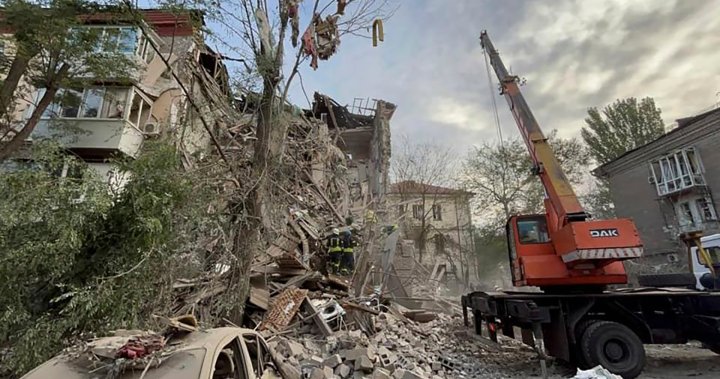
Russian rockets crash into Ukraine’s Zaporizhzhia near nuclear plant
Global News
In his nightly address, a defiant Volodymyr Zelenskyy switched to speaking Russian to tell the Moscow leadership that it has already lost the war that it launched Feb. 24.
Seven Russian rockets slammed into residential buildings in the southern Ukrainian city of Zaporizhzhia before dawn Thursday, killing one person and trapping at least five in the city close to Europe’s biggest nuclear power plant, the governor of the mostly Russian-occupied region said.
The strikes came just hours after Ukraine’s president announced that the country’s military had retaken three more villages in one of the regions illegally annexed by Russia, the latest battlefield reversal for Moscow.
Governor Oleksandr Starukh wrote on his Telegram channel that many people were rescued from the multi-story buildings, including a three-year-old girl who was taken to a hospital for treatment. He initially reported two people were killed but later said that one woman initially thought to have died was saved by doctors.
Photos provided by emergency services showed rescuers scrambling through rubble in the wreckage of a devastated building.
Regional authorities reported another rocket attack later in the morning, but there were no immediate details of casualties or what was struck.
The deputy head of the Ukraine president’s office, Kyrylo Tymoshenko, said 10 people had been killed in the latest Russian attacks in the Dnipro, Donetsk, Zaporizhzhia and Kherson regions.
Zaporizhzhia is one of four regions that Russian President Vladimir Putin annexed in violation of international laws on Wednesday, and is home to a nuclear plant that is under Russian occupation. The city of the same name remains under Ukrainian control.
The head of the UN’s nuclear watchdog is expected to visit Kyiv this week to discuss the situation at the Zaporizhzhia facility after Putin signed a decree Wednesday declaring that Russia was taking over the six-reactor plant. Ukraine’s Foreign Ministry called it a criminal act and said it considered Putin’s decree “null and void.” The state nuclear operator, Energoatom, said it would continue to operate the plant.











